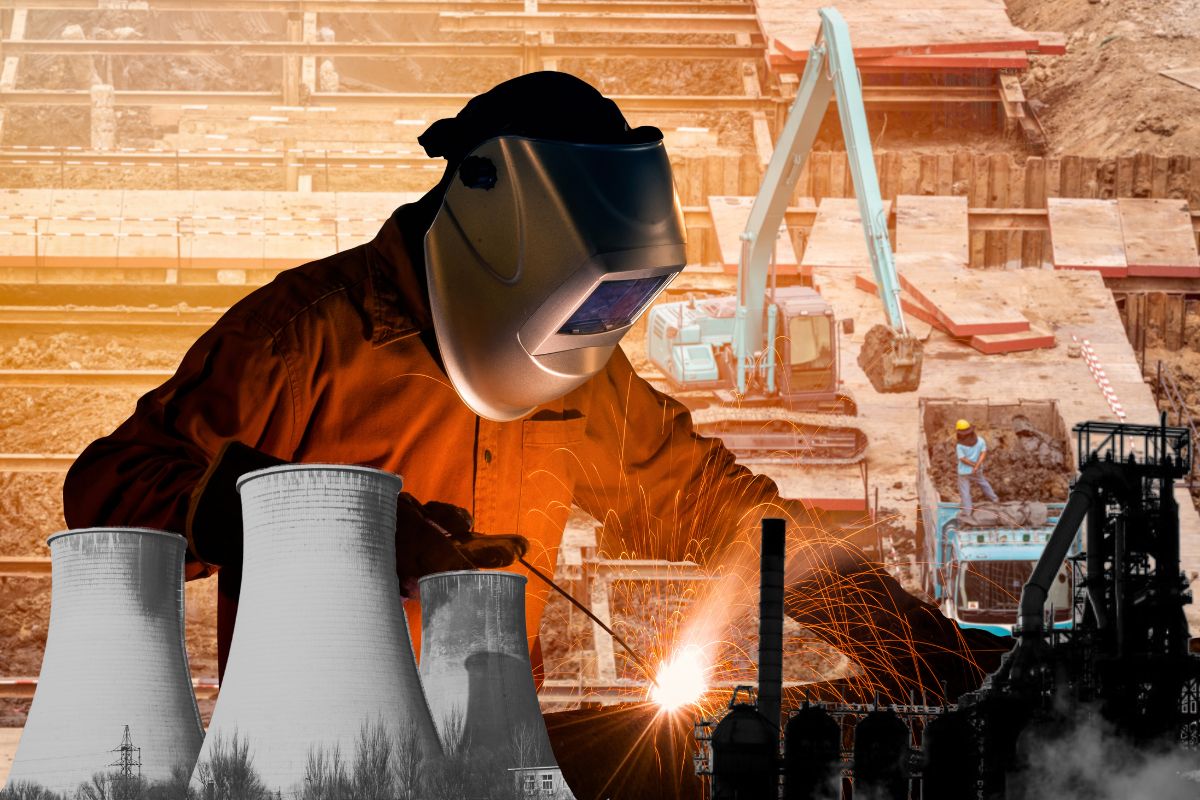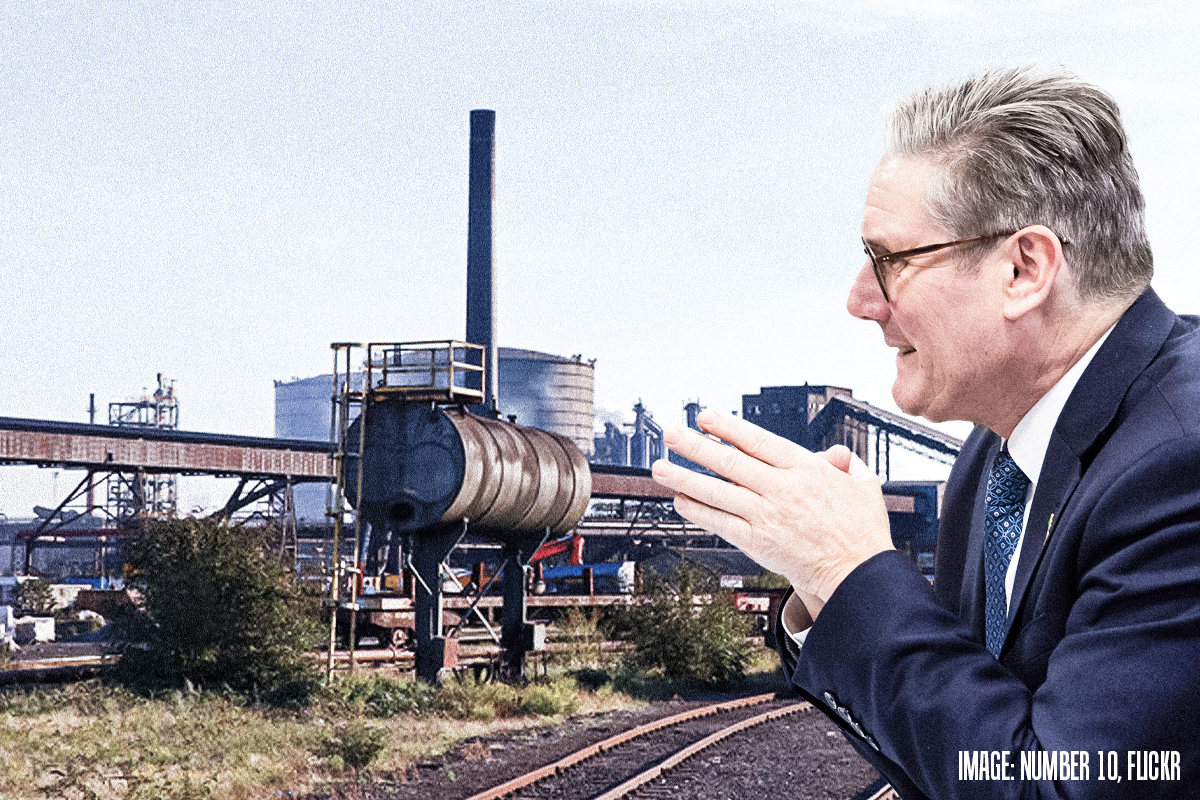On Saturday 12 April, Keir Starmer recalled Parliament to pass emergency legislation aimed at keeping Scunthorpe’s steelworks from closing their gates and preventing an immediate jobs massacre.
This came following the collapse of talks between the Labour government and British Steel’s owners, Jingye. On the day this legislation passed, angry steelworkers even prevented employees of the Chinese investment firm from entering the premises.
British Steel is not yet nationalised, though this eventuality seems likely. Instead, the new legislation grants government ministers ‘special powers’ to direct private steel companies in England, where necessary.
No amount of tinkering will suffice, however. Now is time for bold measures.
The disaster looming over workers in Scunthorpe is a warning of the catastrophe coming for the whole of British capitalism. The crisis in the steel industry is the canary in the coalmine.
To defend our communities and livelihoods against this devastation, we need socialist planning and workers’ control.
Bosses pull the plug

Last week, Jingye bosses began to stamp their feet, refusing to purchase enough raw materials to keep the blast furnaces running, while cancelling and refusing to pay for existing orders.
The steelworks are now in a race against time to get those materials before the blast furnaces begin to go through uncontrolled cooling. This would make it prohibitively expensive to restart production.
Under pressure from below, Labour has stepped in to thwart this corporate vandalism. However, talk about ‘government control over steel companies’ – and possible nationalisation – has fallen far short of what is needed: the expropriation of parasites like Jingye Group.
On the contrary, Labour’s bill aims to compensate steel companies for any costs of continuing production at a loss.
In other words, at the very moment when these profiteering vultures have revealed their incompetence, rather than making the capitalists pay, the government will push any losses onto the shoulders of ordinary taxpayers.
British Steel is losing £700,000 a day. By the end of 2023, it had accumulated debts of £736 million. According to Jingye, meanwhile, the move to electric arc furnaces could cost up to £2 billion.
This puts Starmer in a bind. On the one hand, he has suddenly declared that British Steel must be saved, with the money coming from the public purse. On the other, he has insisted since coming to power that there is a black hole in the budget that has to be ‘balanced’.
This dilemma comes on top of the billions being slashed from the welfare budget to make room for British imperialism’s rearmament drive.
The labour movement must fight for the nationalisation of British Steel, alongside any factory, plant, or workplace threatened with closure. But this must not be a case of simply nationalising the losses, in the wake of the capitalists’ asset-stripping.
Instead, workers must mobilise to demand nationalisation without compensation, under workers’ control – as part of a bold socialist programme to expropriate all the billionaires, bosses, and bankers.
Reform leading Labour
Above all, workers must have no trust in Starmer’s Labour when it comes to protecting jobs and working-class communities.
Any supposed ‘concern’ for workers from these big business politicians is a case of crocodile tears. After all, what did the ‘Labour’ leader do to prevent Port Talbot from being turned into a ghost town? Nothing.
Starmer and co. are not motivated by any genuine concern about steelworkers and their livelihoods. Rather, Labour are clearly aware of the danger that this steel crisis poses to them politically.
In the case of Port Talbot, Starmer came to power when the decision to close the blast furnaces in South Wales was largely a fait accompli that could be blamed on the Tories. Now in Scunthorpe, by contrast, Reform UK are breathing down Labour’s necks.
In regards to British Steel, Nigel Farage and his gang have been publicly calling for nationalisation. In fact, Reform’s deputy leader, Richard Tice, was opportunistically calling for public ownership of the Scuthorpe steelworks before any other Westminster party.
Farage has also popped up at the steelworks for photo opportunities – even cynically holding a union placard with the demand to ‘save our steel’.
Reform UK will nationalise British Steel and protect British workers. #SaveOurSteel pic.twitter.com/fAbmCmdwIv
— Nigel Farage MP (@Nigel_Farage) April 8, 2025
Andrea Jenkyns, notorious Tory defector to the party, was part of this stunt. She is being wheeled out for the Greater Lincolnshire mayoral elections happening in May, and has a real chance of winning precisely because Labour is so hated.
Places like Scunthorpe – deindustrialised, left to rot, and hit hard by austerity – are a hotbed for demagogues like Farage and their right-wing populism. And Labour MPs are no doubt aware of this, worried about losing seats in many such areas to Reform, starting with the upcoming Runcorn by-election.
Right-wing magazine The Spectator therefore has a point with claims that Farage is driving Labour’s policy.
Starmer’s sudden sense of urgency, in large part, has clearly been provoked by the need for him and Labour to save their political skins.
Neglect and decline

Labour ministers, backed by the trade union leaders, have also cited concerns about Britain losing its steel industry as a factor in their decision to rescue the Scunthorpe steelworks.
“[Britain’s steel industry] is part of the pride and heritage of this nation,” asserted Starmer in one recent statement, for example. “It is essential for our future.”
It is true that steel is essential to any developed capitalist economy. And no doubt prestige is an element in Starmer’s thinking, as a reliable servant of British capitalism.
But in truth, British industry, including steel, has been reduced to a rump due to years of underinvestment and offshoring. The UK produced only 0.2 percent of the world’s crude steel in 2024. China produced 53 percent.
Observing this, one industry expert commented in the Observer that “while politically expedient, [the government’s measures are] not a long-term solution”.
Fundamentally, within the confines of capitalism, Labour are not in a position to resuscitate British industry and restore its competitive edge in the world market
Due to decades of neglect and decline, British industry and infrastructure is in a parlous state. It requires billions upon billions in investment to modernise, reequip, and compete.
Yet the capitalists are chronically incapable of providing this. For the last 30 years, when it comes to investment, British capitalism has lagged behind the rest of the OECD by an average of £35 billion per year.
The British state, with Starmer at its helm, is equally impotent. This weakness was graphically demonstrated last year, when the Labour leaders abandoned their £28 billion green investment fund, deeming such spending ‘economically irresponsible’.
The problem is, for little old Britain, £28 billion is too small a sum to compete with the colossal investments that US and Chinese capitalism can gather together, yet too large for the battered British state to comfortably afford.
Now we see the same logic with steel. China is able to produce far more steel – at a far lower cost – than the UK, thanks to the size and efficiency of its facilities.
In fact, China produces so much cheap steel that there is now a serious glut in the world market – a classic symptom of capitalism’s crisis of overproduction.
British industry therefore finds itself crushed between the two capitalist giants, China and the USA, which can easily outcompete it.
To modernise steel production – or indeed any of Britain’s industries – would require such an enormous outlay as to preclude any profit-making in the short run. And it would require levels of investment that British capitalism can never hope to raise.
As has been the tradition since the days of Thatcher’s privatisations, the Labour government would like to attract foreign capital to invest in British industry. Rachel Reeves has desperately tried to entice investors. Yet the money has not been forthcoming.
At the end of the day, investing in the dilapidated UK economy is not an attractive prospect for the capitalists of any origin. They only care about turning a profit. And the threat of increased taxes and regulations on employers has only made investors even more wary.
Squeezed on all sides
Neither free trade nor protectionism offers any hope for British capitalism and its representatives. Instead, Starmer’s government will increasingly be squeezed on all sides.
Rising protectionist tendencies in the world economy are only compounding Starmer and Reeves’ nightmares. British capitalism relies on foreign money coming in; on maintaining the flow of trade with the USA, Europe, and China.
But this whole model becomes a major problem when the world market is splintering into rival blocs, leaving the Labour leaders to perform a difficult and uncomfortable balancing act.
Just three months ago, Reeves was in Beijing trying to attract Chinese finance towards Britain. And just days ago, she added her name to a long list of liberals shouting for a “global free trade fightback” against US tariffs.

The Chancellor should be careful what she wishes for, however. Barred from the US market, China will look for new markets – such as Britain’s – to flood with its exports. And this will mean further crises for British industries and manufacturers.
A UK-US trade deal, meanwhile, if it ever materialises, will only be a return to the precarious situation that existed before Trump’s tariffs, only with Britain now potentially cut off from trade and investment with China.
Whilst semi-courting China, the British ruling class cannot fathom breaking the ‘special relationship’ with US imperialism. And Washington has made clear that it is not all too happy with Britain’s attempts to woo its main rival.
In a somersault worthy of a professional acrobat, therefore, Reeves has now declared a “China audit” of Britain’s ‘strategic sectors’ and supply chains. This could affect Grangemouth oil refinery in Scotland, where workers have also been fighting the looming threat of mass layoffs.
Of course, the British establishment and its representatives are happy to partake in a bit of chauvinistic China-bashing, with warnings about Chinese involvement in areas of ‘national security’.
But the truth is that British Steel has failed not because its owners are foreign. UK industry is failing because its owners are capitalists.
At the same time, as already highlighted, British capitalism is too weak and puny on the world stage to seriously pursue the path of economic nationalism and state intervention.
Within the confines of capitalism and its deepening crisis, no UK government will be able to find the money to invest in Britain’s industries. And so the agonising decline of British Steel, Grangemouth, and the rest of UK industry will continue.
Need for planning
Whichever way Labour turns, sooner or later they will run into the same problem: British capitalism is a minnow in a sea of sharks.
On the basis of economic nationalism and state-led protectionism, Starmer’s efforts will quickly hit a dead end. Yet globalisation and privatisation has also been a disaster for the working class, in Britain and internationally.
In short, British capitalism is too weak to prop up its industries, yet also too weak to survive in the arena of free trade.
The only road out of this impasse is a socialist one.
What is required is not a purely defensive battle to save failing industries, but a fighting struggle to bring the ‘commanding heights’ of the economy – from Britain’s heavy industry to its finance houses – under common ownership and workers’ control.
Instead of constant rearguard battles, or running around to put out fires, the labour movement needs to go on the offensive.
Why wait for industries to collapse before we demand their nationalisation? Why give the capitalist robber-barons the chance to steal more public money?
The unions must demand that all key industries – profitable and unprofitable – be placed under workers’ control. The entire capitalist class should be expropriated, without so much as a penny in compensation.
Above all, what is needed is a rational, democratic plan of production, so as to direct investment without care for profits, but in the interests of society.
This must not stop at Britain’s borders, but be spread internationally through appeals to our class brothers and sisters across the world.
Until capitalism, our livelihoods and communities will never be more than small change in the balance-sheets of the bosses. Workers in Scunthorpe, across Britain, and everywhere deserve a better fate than that.






